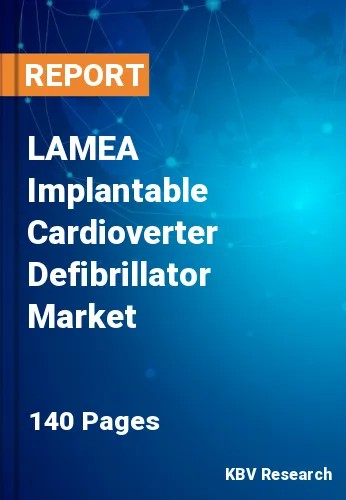The Latin America, Middle East and Africa Implantable Cardioverter Defibrillator Market would witness market growth of 8.9% CAGR during the forecast period (2023-2030).
Advancements in ICD technology has led to improved device performance, longer battery life, and increased patient comfort. These factors have contributed to greater acceptance and adoption of ICDs. Introducing remote monitoring capabilities in ICDs has improved patient care and reduced healthcare system costs. It allows for real-time device function and patient status monitoring, leading to early detection of issues and timely interventions. The development of MRI-compatible ICDs has increased their attractiveness to patients and healthcare providers.
Advancements in ICD technology has led to improved device performance, longer battery life, and increased patient comfort. These factors have contributed to greater acceptance and adoption of ICDs. Introducing remote monitoring capabilities in ICDs has improved patient care and reduced healthcare system costs. It allows for real-time device function and patient status monitoring, leading to early detection of issues and timely interventions. The development of MRI-compatible ICDs has increased their attractiveness to patients and healthcare providers.
The UAE has adopted S-ICDs as a viable option for select patients. MRI-compatible ICDs are becoming increasingly available in the UAE. Healthcare providers in the UAE can remotely monitor device function and patient status, allowing for timely intervention and reducing the need for frequent in-person visits. The UAE's healthcare sector is characterized by its commitment to adopting cutting-edge medical technologies. Technological innovations in ICD design contribute to better patient care and outcomes in the region, aligning with the UAE's vision of providing world-class healthcare services. As technology advances, UAE patients can expect even more sophisticated ICD options and improved cardiac care, hence, the market will expand.
The Brazil market dominated the LAMEA Implantable Cardioverter Defibrillator Market, By Country in 2022, and would continue to be a dominant market till 2030; thereby, achieving a market value of $94.3 million by 2030. The Argentina market is registering a CAGR of 9.5% during (2023 - 2030). Additionally, The UAE market would showcase a CAGR of 8.6% during (2023 - 2030).
Based on Type, the market is segmented into Biventricular Devices, Dual Chamber ICDs and Single Chamber ICDs. Based on Product Type, the market is segmented into Transvenous and Subcutaneous. Based on NYHA Class, the market is segmented into NYHA Class II and NYHA Class III. Based on End-Use, the market is segmented into Hospitals, Ambulatory Surgical Centers and Others. Based on countries, the market is segmented into Brazil, Argentina, UAE, Saudi Arabia, South Africa, Nigeria, and Rest of LAMEA.
Free Valuable Insights: The Worldwide Implantable Cardioverter Defibrillator Market is Projected to reach USD 5.6 Billion by 2030, at a CAGR of 6.1%
The market research report covers the analysis of key stake holders of the market. Key companies profiled in the report include Abbott Laboratories, Medtronic PLC, Biotronik SE & Co. KG, Boston Scientific Corporation, MicroPort Scientific Corporation, Stryker Corporation, ZOLL Medical Corporation (Asahi Kasei Corporation), LivaNova PLC, Koninklijke Philips N.V. and Getinge AB.
By Type
By Product Type
By NYHA Class
By End-use
By Country
Our team of dedicated experts can provide you with attractive expansion opportunities for your business.

